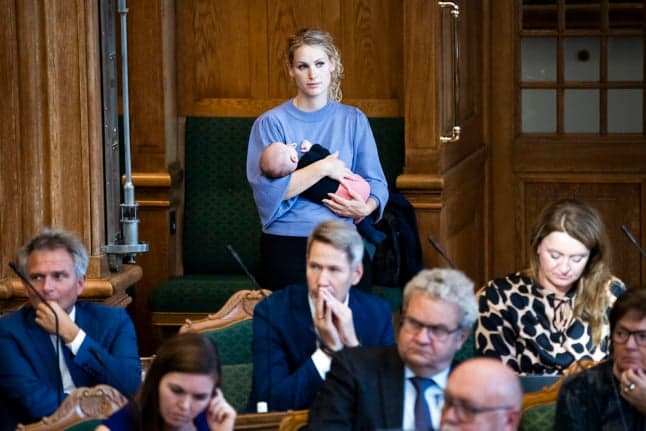Danish parliament again throws out lawmaker for bringing baby

For the second time in recent years, a member of the Danish parliament has been asked to leave the parliament after bringing their infant with them to a debate. Pernille Skipper of the Red Green Alliance was asked during Thursday’s opening debate to leave the parliamentary chamber with her baby. Pia Kjærsgaard, former leader of the Danish People’s Party, was in the Speaker’s chair at the time.
Skipper confirmed to news wire Ritzau that the episode had occurred but added no further comment.
On Twitter, the former lead political spokesperson for the Red Green Alliance sarcastically described her “quiet, sleeping baby” as “Pia Kjærsgaard’s biggest headache”.
According to newspaper Politiken’s report, Kjærsgaard asked Skipper to leave the room via two post-it notes which were passed on to her by an assistant.
It is not the first time Kjærsgaard has been involved in throwing a mother and infant out of a parliamentary debate.
In March 2019, she ordered Conservative MP Mette Abildgaard to remove her infant daughter from parliament's chamber, sparking surprise in a country often hailed as a pioneer in women's rights and resulting in international media reporting the episode.
The former Danish People’s Party leader defended the decision and said other parliamentarians agreed with her.
“We’ve just recently spoken about this in the presidium because several members of parliament have raised with us that Pernille Skipper has brought her baby with her on repeated occasions,” she told newspaper Ekstra Bladet.
“Everyone knows that you just don’t do that. So I’m surprised it was necessary to reaffirm this to her. Everyone knows about this,” she added.
Kjærsgaard is not the speaker of parliament (although she has previously served in the role) but is a member of the presidium, meaning she can step in to take over speaker duties when the current Speaker, Social Democrat Henrik Dam Kristensen, is not present.
In a written comment to broadcaster DR, Kristensen said Kjærsgaard’s actions were by the book.
“The presidium took in 2019 the decision that babies don’t belong in the parliament chamber. That decision has not been changed,” he said.
In 2016, an Icelandic lawmaker made headlines after breastfeeding her infant while speaking at the podium in parliament. In the same year, New Zealand prime minister Jacinda Ardern became a symbol for working mothers when she brought her baby to the UN General Assembly in New York.
READ ALSO: Babies not welcome in parliament, Danish speaker says
Comments
See Also
Pernille Skipper of the Red Green Alliance was asked during Thursday’s opening debate to leave the parliamentary chamber with her baby. Pia Kjærsgaard, former leader of the Danish People’s Party, was in the Speaker’s chair at the time.
Skipper confirmed to news wire Ritzau that the episode had occurred but added no further comment.
On Twitter, the former lead political spokesperson for the Red Green Alliance sarcastically described her “quiet, sleeping baby” as “Pia Kjærsgaard’s biggest headache”.
According to newspaper Politiken’s report, Kjærsgaard asked Skipper to leave the room via two post-it notes which were passed on to her by an assistant.
It is not the first time Kjærsgaard has been involved in throwing a mother and infant out of a parliamentary debate.
In March 2019, she ordered Conservative MP Mette Abildgaard to remove her infant daughter from parliament's chamber, sparking surprise in a country often hailed as a pioneer in women's rights and resulting in international media reporting the episode.
The former Danish People’s Party leader defended the decision and said other parliamentarians agreed with her.
“We’ve just recently spoken about this in the presidium because several members of parliament have raised with us that Pernille Skipper has brought her baby with her on repeated occasions,” she told newspaper Ekstra Bladet.
“Everyone knows that you just don’t do that. So I’m surprised it was necessary to reaffirm this to her. Everyone knows about this,” she added.
Kjærsgaard is not the speaker of parliament (although she has previously served in the role) but is a member of the presidium, meaning she can step in to take over speaker duties when the current Speaker, Social Democrat Henrik Dam Kristensen, is not present.
In a written comment to broadcaster DR, Kristensen said Kjærsgaard’s actions were by the book.
“The presidium took in 2019 the decision that babies don’t belong in the parliament chamber. That decision has not been changed,” he said.
In 2016, an Icelandic lawmaker made headlines after breastfeeding her infant while speaking at the podium in parliament. In the same year, New Zealand prime minister Jacinda Ardern became a symbol for working mothers when she brought her baby to the UN General Assembly in New York.
READ ALSO: Babies not welcome in parliament, Danish speaker says
Join the conversation in our comments section below. Share your own views and experience and if you have a question or suggestion for our journalists then email us at [email protected].
Please keep comments civil, constructive and on topic – and make sure to read our terms of use before getting involved.
Please log in here to leave a comment.